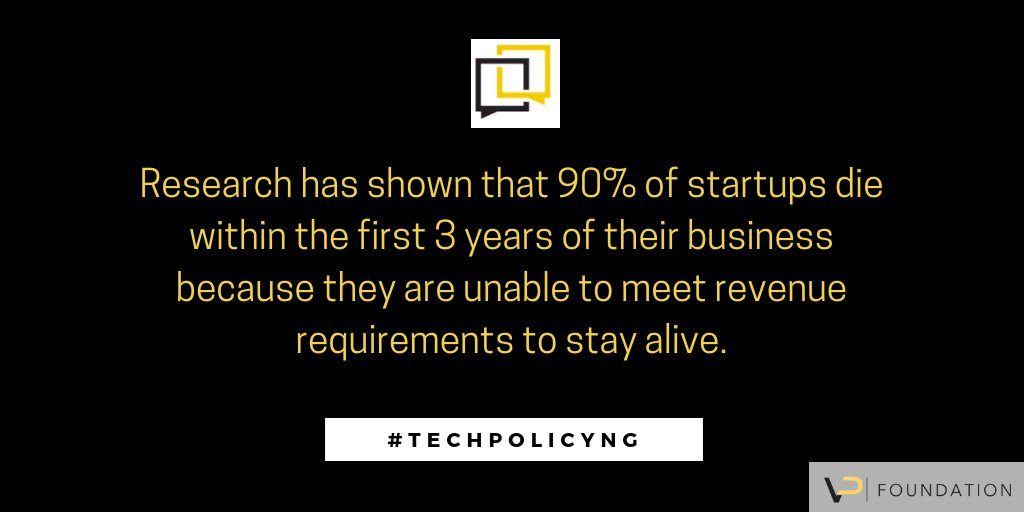
Hello there!
Welcome to a new week. I sure am thankful for another opportunity to hit those goals. I hope you are as well.
The rapidly concluding month of October certainly kicked off on a strong reality check note for Nigeria as we celebrated 58 years of Independence. Wow! We’ve certainly come a long way as a country. But before we bemoan the woes and challenges, the question is, what part are you actively playing in charting the way forward for Nigeria?
Here’s something for you to ruminate on. In case you missed my post detailing my viewpoint on the coming elections, you can check it out here. Don’t forget to tell me what you think in the comment section. Thank you.
Moving on to today’s post, I received an invite to the Ecosystem Dialogue Series (EDS) a couple weeks ago, a bi-monthly policy program coordinated by Adaeze Sokan, Director, Policy & Learning, Ventures Platform Foundation. Ventures Platform Foundation is the social impact arm of Ventures Platform, an innovation hub in Abuja that facilitates human capital development, provides workspaces and backs Pan-African entrepreneurs and innovators to generate sustainable solutions, leveraging on technology.
The primary objective of the EDS is to convene entrepreneurs, startup pioneers, investors, hubs, government and key stakeholders in the ecosystem to discuss policy issues and key challenges that affect startups in Nigeria.

Worthy of note is the fact that in the end, these discussions are geared to form a comprehensive feedback report that will be an influential force to reckon with in policy-making in the respective government institutions and help simplify government processes. Mr Uwem Akpan, an assistant director at the National Investment and Promotion Commission (NIPC) who served as a government representative was in attendance.
The thematic focus of the conversation centred around taxation matters that affect startups. Following the welcome address and introduction, an opportunity was given to participants at the dialogue session to share some of their challenges as taxpayers. Amongst concerns around tax clearance and remittance that were expressed, a fundamental concern that came up for discussion was the Pioneer status.
Demystifying The Pioneer Status
Basically, Pioneer status is a fiscal incentive awarded to pioneer businesses in selected industries that grants them income tax holiday for a period of time.
The Pioneer status is provided under the Industrial Development (Income Tax Relief) Act, Cap I7, Laws of the Federation of Nigeria, 2004 (IDA).
Under the act, “Eligible companies operating in designated pioneer industries and or producing pioneer products, which apply for and are granted pioneer status, are entitled to income tax holiday for up to five (5) years – three (3) years in the first instance, renewable for an additional maximum period of two (2) years. In addition to income tax holiday, pioneer companies enjoy other benefits, such as the exemption of dividends paid out of pioneer profits from withholding tax.”
The grant of pioneer status is noted to have attracted significant investments to key sectors of the Nigerian economy.
Is The Pioneer Status A Viable Tax Incentive For Startups?
Initially, the pioneer status seemed like an attractive incentive for businesses but it was limited to a certain taxpayer category. As expressed by a couple of entrepreneurs at the dialogue series, first, it was for traditional medium-to-large businesses and not startups.
Now, startups are remarkably different from traditional business ventures in that they are disruptive in nature, mostly technology driven and have a high potential for growth because the new or novel product or service they create is designed to meet the need of a huge market. A startup is primarily anchored on the wheels of bold innovation that aims at revolutionalising a sector and is funded or backed by capital from venture capitalist firms. Traditional business ventures, however, whether small, medium (SMEs) or even large are different in that they are independent firms established to provide an essential service in a sector that is already in existence and not necessarily driven by technology or innovation. A traditional business venture can simply generate capital from loans.

According to Adaeze, the EDS host, “Statistics show that startups are instrumental for job creation with at least 56% of them employing people within from the 12-35 years age bracket, revenue generation, foreign direct investment (FDI) attraction to mention but a few. Averagely, about 55% of startups raise about 94,000dollars for the economy. This means that when supported, startups are capable of capitalizing huge economic development for Nigeria in ways that we have never imagined.”
And so, for us to achieve the multi-beneficial results of supporting startups, it is important that the peculiarities of startups weigh in on the design and formulation process of regulatory policies. This will serve to mitigate barriers to the development of startups.
Secondly, the success of the application process is hinged on both capital and time intensive prerequisites, such as a considerably large sized factory, huge share capital investment and sometimes spanning over a period of up to 24 months.
Invariably, the underlying goal of enabling startups which ultimately contributes to the growth of the economy is not realised because the provisions of the policy and its target taxpayer category are not a viable option for many startups in their beginning pilot phase where they are seeking capital from venture capitalist firms.
As such, this gave rise to the agitation for more practicable startup tax incentives from the government and formed the thrust of the dialogue. Drawing from the concerns raised at the forum, the question is, what kind of ideas or solutions can inform feasible and uncomplicated tax incentive proposal to the government?
Below are a collation of my thoughts on some of the views shared during the dialogue session;
Simplify The Tax Process To Drive Traction and Compliance.
The process of tax collection, payment and refunds should be simplified and its efficiency should improve consistently. Obsolete provisions in tax laws should be reviewed and reformed consistently in tune with changes in the economy. This will stimulate the economy’s growth and position the country for foreign investment.
A PricewaterhouseCoopers (PwC) report published on www.orandcconsultants.com on the top 50 tax issues in Nigeria notes that according to the World Bank’s Doing Business 2011 report, Nigeria ranks 137 out of 183 countries surveyed on the ease of doing business and 134 on the ease of paying taxes. In the 2010 report, Nigeria ranked 134 and 131 on the ease of doing business and paying taxes respectively. Nigeria has been slipping back consistently on the ease of Paying Taxes index which is a function of three main indicators; number of tax payments, time required to comply with tax obligations and total tax rate. At 134, Nigeria is far behind a number of other African countries such as Mauritius (12), South Africa (24), Zambia (37), and Ghana (78) all competing for foreign direct investments.
One such tax hurdle according to the PwC report is the tax clearance certificate. Typically, taxpayers are required to obtain a tax clearance certificate (TCC) annually which is often needed to conduct many business transactions. Unfortunately, tax officials often use this as a tool to harass taxpayers by bringing up issues outside the period covered or contrary to the provisions of the law regarding TCC.
Case in point, it took my organisation about six months to obtain a tax clearance certificate, a cumbersome process that not only set us on a wild goose chase from one tax district office to another but one that cannot also be articulated as a guide for another entrepreneur. Till date.
As shared earlier, the bureaucratic process of filing and gaining tax clearance for my organisation was so complex and exasperating that I almost decided to put tax paying on the back burner. The process should be so seamless, the government’s tax machinery like the Federal Inland Revenue Service (FIRS) can borrow a leaf from the CAC which has a one-stop-shop portal that simplifies the registration process for organisations.
We can build a system that is engaging and user-friendly for taxpayers. It could also translate to the design of a transparent, efficient network between the tax and banking sector where there’s a direct tax payment application or accounting software technology in place, as the taxpayer receives payment for a product or service, his tax is remitted automatically and the taxpayer doesn’t need to go through the hassle of calculating what the tax amounts to.
The role of tax consultants is notably important but simplifying the tax payment process is a key incentive that the government can introduce to improve tax payment.
The need for Tax Education
Tax education should be simplified. Every entrepreneur in the process of starting a business should know what the tax procedure entails, second to processing a CAC registration.
This is another challenge the government needs to address. The Nigerian tax system should be stripped of all ambiguity and mystery so that individuals and corporations can have a clear-cut understanding of tax policy, tax legislation, tax administration and the respective tax agents or authorities.
This should be codified in simple, comprehensible online and offline formats for all the stakeholders in the tax sector. Tax laws, circulars, regulations, administrative procedures etc should be easily accessible on the internet. In addition, the government should produce a tax data card or flier for easy, public consumption.
FIRS reportedly has a pamphlet of this sort but it needs to increase in proliferation and circulation.
Currently, the Nigerian Investment Promotion Commission has an information desk in their office where you can walk in to gain clarity and ask questions concerning taxation matters. There should be an increase in more centres like this distributed all over the country at key hubs and commerce districts.
People need to know what they should pay, how to calculate their taxes and what constitutes a multiplicity of taxes. While recounting his tax remittance challenge, another entrepreneur stated that his company provides services to schools and although schools are granted some form of tax exemption, his organisation is still expected to pay tax, a reality he doesn’t fully understand.
The implications of taxation on the Nigerian business climate is of high-reaching impact and cannot be overemphasized. The aforementioned PWC report posits that in spite of its predominant position as one of Africa’s leading economies, Nigeria faces the risk of losing out to smaller more progressive nations such as Ghana and Mauritius as a prospective destination for holding companies and other investments into Africa including shared service centres.
Although Nigeria has made some improvements to the tax system in the recent past, there is still a long way to go.
The role of Tax Holidays as an incentive to foster innovation.
Tax Holidays are a temporary reduction or elimination of tax payment and serve as a form of relief for businesses and enables businesses to accrue substantial profit that can be channelled back into the business in order to create jobs and accelerate productivity and development in the sector in which that business is categorised.
Providing tax holidays is necessary for startups for additional reasons;
- It is investor friendly.
- Simple to understand and implement
- Stimulates and attracts domestic and foreign direct investment.
Tax holidays are very important and while we are not suggesting a tax holiday from the VAT or Sales tax, there are other taxes that can be granted holiday such as Payee. Here’s why, at the point where the business is taking off, most startups, often than not, are unable to adequately pay the desired or commensurate remuneration for their staff and yet are still expected to remit tax on the money these startups have to pay staff. The government should consider exempting startups in this area while the VAT which is charged on clients payments continues.
Last year, the Federal Government approved a list of 27 new industries eligible for the pioneer status exemption. These 27 new industries comprised businesses in their first year of operation in sectors such as poultry production, coal mining and production, plastic and rubber manufacturing, food and beverage processing machinery, music production, e-commerce services, real estate, leather processing, video and television production and distribution, photography etc. However, this is limiting in its prerequisites so it should also be applied to small and medium enterprise startups as well.
Additional tax holidays can also be granted to businesses such as the aviation sector that is plagued with the multiplicity of taxes and levies, the agricultural sector with emphasis on farming and staple crop producing firms and perhaps the electricity sector if it were completely deregulated.
Tax holidays should be clearly specified with regards to the eligible form of taxes. Are they federal income taxes or local taxes or trade taxes or employment taxes? It should be clearly delineated what tax category/payer is eligible.
Furthermore, tax holidays should entail strict filing and reporting requirements to monitor compliance and dispute or recapture resolutions in the event of conflict. The tax holiday form or document should include key elements like the start date, scope of the tax holiday, termination procedure and end date.
The tax regulatory institutions must be strengthened to regulate businesses and serve as a check for tax abuse by taxpayers.
However, the tax sector representative at the dialogue series noted that there were alternative options for tax incentives which can be beneficial to startups. He stated that the government can support startups without providing tax incentives, rather they can support startups with grants, mentorship programmes, funding schemes, increased access to credit facilities etc.
Why Do Startups Need Tax Incentives?
- The Argument For Economic Impact: Startups at its core, are disruptive, contributing to a nation’s development or advancement in more than one ramification. They create new industries, open new markets and demand for certain services. Although they may not be profitable with regards to remitting tax in the interim, when allowed to thrive, the income they will generate for the economy in the long term is greater than the growth-stifling tax collected from them that will end up denying us the long-term benefits both for the economy and eventual taxation.
It is therefore pertinent to think long-term with regards to startups and taxation.
- Disruptive Nature of Startups: In the bid to challenge current realities, startups are fueled by new ideas and thrive on unproven business models. As a result, there is a lot of trial and error which makes them prone to failure.
Thus, the government needs to be less stringent in levying them and create an enabling environment for them to experiment so that the government doesn’t contribute to the factors that negatively affect the growth of startups and cause them to fail.
- Funding Capital Challenge: Startups typically experience challenges in raising capital to take-off. There is a notable scarcity or lack of funds needed to pilot many startup projects.
In another vein, the tax sector should direct focus on assessing the viability of startups for tax incentives through clear-cut indicators entailing numbers and profit analysis, strategies, business model etc. This will facilitate the provision of enabling tax incentives that will promote the growth of these startups.
Most importantly, I think it is crucial that startups are brought into ongoing policy conversations centred around taxation and not just restricted to the big fish industries or organisations. It is worthy of note that Ventures Platform Foundation is already charting the course in this regard but this is a direction that other hubs and civil societies can key into.
Beyond taxation, any new policy that affects businesses in Nigeria, especially startups needs to be representative of more voices, more ideas, inputs, takeaways, thoughts and positions. We need to involve more people in these conversations as this will ultimately influence the direction of policy formulation.
Are you an entrepreneur? Do you work with a startup? What’s your take? Please share with us in the comment section.
UPDATE- November 28, 2018
Ventures Platform just released a 12 paged Ecosystem Dialogue Series (EDS) Policy Brief. You can access it here;

About the Author
Century Favour is an Entrepreneur, Strategy, Technology, Marketing and Creative professional passionate about driving economic & social impact. Through his ventures (Endgame The Strategy Company, Do take action & centuryfavour.com) he works to ensure that People, Businesses, Governments & Non-Profits grow, succeed, achieve their strategic objectives, drive sustainable development and positively shape the future of the people & communities they serve.

About the Author
Century Favour is an Entrepreneur, Strategy, Technology, Marketing and Creative professional passionate about driving economic & social impact. Through his ventures (Endgame The Strategy Company, Do take action & centuryfavour.com) he works to ensure that People, Businesses, Governments & Non-Profits grow, succeed, achieve their strategic objectives, drive sustainable development and positively shape the future of the people & communities they serve.